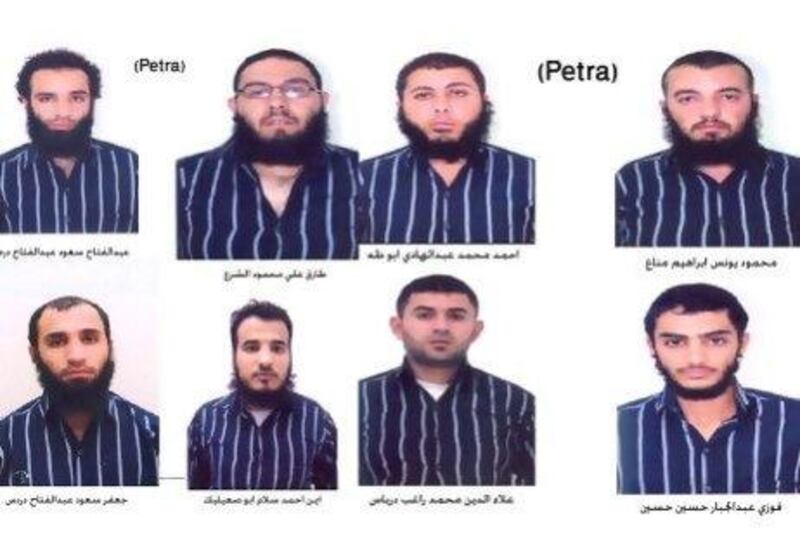AMMAN // A Jordanian soldier died yesterday trying to stop armed militants crossing the border to join the war in Syria.
Mohammed Abdullah Al Munasir, a 25-year-old corporal, was the first Jordanian to be killed in Syria-related violence.
A military source said soldiers chased a group of eight armed men trying to cross the border. "They refused to stop and opened fire", killing the corporal before the gunmen and their weapons were captured, he said.
It is not known if the militants were Jordanians or foreign fighters trying to join the uprising against the Syrian leader Bassar Al Assad.
A number of foreign Islamists are fighting with rebels in Syria, and Jordan's banned Salafi movement has sent several fighters, some of whom have been caught by Jordanian border patrols.
Meanwhile 11 Jordanians with suspected links to Al Qaeda who were arrested after returning from Syria were charged yesterday with plotting terror attacks in Jordan.
"They sought to destabilise Jordan," the Jordanian information minister Samih Maaytah said. "They plotted against Jordan's national security."
The charges include carrying out a terrorist plot and possession of automatic weapons and explosives. If convicted, the men face life sentences of up to 20 years.
A Jordanian security official involved in the investigation said some of the 11 were affiliated with the Salafi movement.
Authorities said the group planned to attack two shopping malls, the US and British embassies and other diplomatic missions in Abdoun, an upmarket district in West Amman.
The plot is the first public case of terrorism since the bombing of three hotels in Amman nearly seven years ago that killed 60 people. Al Qaeda said it carried out those attacks because of Jordan's alliance with the United States and its 1994 peace treaty with Israel.
Jordan's state TV broadcast the names and photographs of the 11 men, said to be in their twenties and thirties, most of whom wore long beards. It described them as militants.
Jordan's intelligence agency said the group "adopts the ideology of Al Qaeda" and that it nicknamed its terror plot "9/11 the second" - a reference to the Amman hotel blasts on November 9, 2005.
Since June, the men have been surveying targets across the country and bringing in rockets from Syria, the intelligence agency said, and the group also planned to carry out suicide attacks using explosive belts.
Security on Jordan's northern frontier has been tightened since the start of the uprising in Syria last year. An average of 500 Syrian refugees enter Jordan each day.
"Security is already tight on the border as a precautionary measure and there have not been any extra measures," said Mr Maaytah. "There are indications that more than one group has been trying to carry out different activities. Yet it is too early to say if it is an ongoing process."
A Salafi leader in Jordan, Mohammad Chalabi, dismissed the government's charges against the 11 men. He said they had not been in Syria, although he said 150 others had joined the fight to topple Mr Al Assad.
"It is completely against our conviction to target malls and innocent Muslims," he said. "The situation in Jordan does not allow for such acts. The men do not believe in targeting innocents. They do not seek to carry out military operations inside Jordan. Our target is activities against Bashar Al Assad. Jihad is to defend ourselves in Syria, Iraq and Afghanistan."
One analyst cast doubt on both Salafi and government accounts.
"After the Arab Spring, the Salafi-Jihadi movement has adopted a peaceful approach and stood against any military acts inside Jordan," said Hassan Abu Hanieh, an independent analyst of Islamist groups.
"But there could be radicalised elements among the youth who do not share their leaders' views. This is an old dispute inside the movement."
* Additional reporting by the Associated Press and Agence France-Presse





